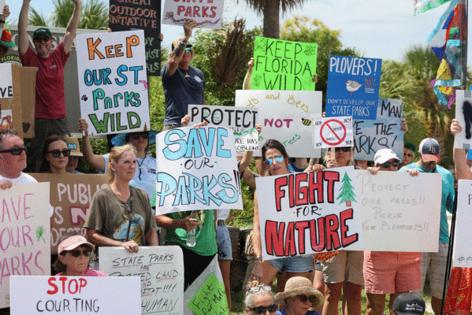After wanting golf in state parks, Florida Gov. Ron DeSantis must now decide on a bill to ban it
Published in News & Features
The Florida Legislature delivered a decisive victory to residents who treasure their state parks Thursday, as the House passed an amended version of the bill to ban the construction of golf courses, hotels, pickleball courts and similar amenities on park land.
Thursday’s vote to approve the bill was unanimous, just as it was the day prior in the Senate. It will now head to the desk of the governor, whose administration first hatched the park development plans that triggered mass public outrage.
Gov. Ron DeSantis has not said whether he will sign it, despite weeks of texts and emails to his office asking about his stance from the Tampa Bay Times. The sponsor of the bill, Republican state Sen. Gayle Harrell, has said she doesn‘t know the governor’s intentions.
More than a year before the scandal erupted, DeSantis’ top staffers had a phone call with Lt. Col. Dan Rooney, the head of a veterans nonprofit with close ties to famed golfer Jack Nicklaus. In April of last year, DeSantis sat down with him personally.
In the months between those two meetings, Rooney had shopped around an idea with several state and local lawmakers to build a Nicklaus-designed golf course in Southeast Florida’s largest park, Jonathan Dickinson State Park in Martin County.
Recognizing how beloved the park’s rare and imperiled scrub habitat was to their constituents, lawmakers firmly told Rooney it was a bad idea.
“That is not going to happen,” Harrell remembers telling him.
“You are going to start a war with the people,” Harold Jenkins, chairperson of the Martin County Commission, said he told Rooney.
Despite their advice, Rooney took his idea to the highest office in Florida. After the meeting with DeSantis, the plans moved forward.
After obtaining leaked documents and following a vague news release from state environment regulators, the Tampa Bay Times first reported the administration‘s plans to develop nine parks, from Miami to the Panhandle, with hotels, pickleball courts and golf courses.
Records would later show the development plans had, at one point, included 17 additional state parks as possible recipients of lodges and golf courses. The pushback was immediate and bipartisan, with U.S. senators and members of Congress joining city governments in their opposition.
As public backlash reached a fever pitch, the DeSantis administration dug in its heels.
“It’s high time we made public lands more accessible to the public,” said one DeSantis spokesperson, Jeremy Redfern.
“Everyone should be able to enjoy Florida’s natural treasures without long waits or cramped campsites,” said another spokesperson, Bryan Griffin.
The state agency that oversees parks, the Florida Department of Environmental Protection, defended the development proposals on social media.
Building a 350-room hotel on fragile dune habitat at Anastasia State Park in St. Augustine would “provide more overnight accommodations,” the agency wrote on X. Another hotel at Topsail Hill Preserve State Park in the Panhandle would “take the visitor experience to the next level,” the agency wrote.
The defense of the proposals didn‘t end there: Golf is “one of our nation‘s most popular sports,” the agency said about its plan to develop the rolling scrublands of Jonathan Dickinson State Park with golf greens.
But when he shelved the idea, DeSantis claimed that his administration‘s proposal was “not approved by me, I never saw that.”
His signature is now all that’s required to enshrine the bill into law.
Lawmakers, already entrenched in other fights with the governor at the end of a contentious legislative session, have portrayed this measure not as a rebuke of DeSantis but as a direct response to the outcry of their constituents.
“We’ve put real plans in place to make sure for generations to come, our state parks will be preserved,” Republican Rep. John Snyder, one of the bill’s House sponsors, told his fellow lawmakers Thursday. He said he grew up canoeing with his family in Jonathan Dickinson State Park.
Environmental groups, many of which had helped organize protests across the state, celebrated the vote.
“We made our voices impossible to ignore. The Florida Legislature heard us loud and clear,” wrote Javier Estevez, the political and legislative director for the Sierra Club Florida, in a statement. “Today, we can proudly say: WE WON!”
_____
©2025 Tampa Bay Times. Visit tampabay.com. Distributed by Tribune Content Agency, LLC.







Comments